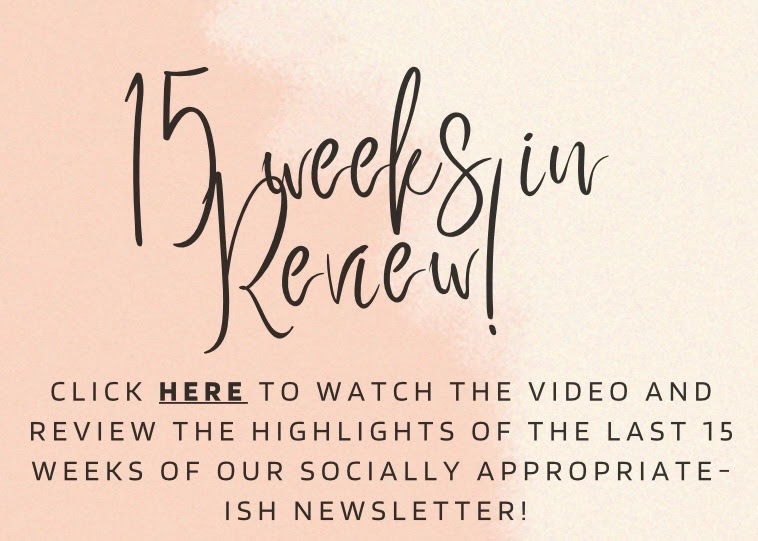15 Weeks In Review! 🎉
Feb 16, 2022
Options, options! This week, in an effort to be more creative (“c” word alert!) I decided to try something different. You can either read the text below, or you can watch the video of the review by clicking the picture below!
Yes, I put together a review for you! Whether you are new to our family, or have joined recently, I hope this review will be helpful. Too often, we enjoy and learn a new concept, only to be forgotten moments later. (Please tell me that’s not only me.)
So sit back and enjoy as we transfer this knowledge from our short term memory into our long term memory!
A quick thank you to all of you who have joined our Socially Appropriate-ish Family. I am truly humbled by the response to this newsletter and committed to bringing you great content, up to date research, about everything and anything related to family therapy, social skills and emotion management (or anything else that comes to mind)!
❤️, Shifi
15 WEEKS! HERE WE GO…
Socially Appropriate-ish
Life is about connecting to the people around us, and there’s no better way to connect than being open and honest about life’s issues. Any time. Any place. (Not literally.) It’s what I try to do here - share tips and experiences with you while also making sure to keep it 100% real. Does that sometimes seem slightly inappropriate? Maybe! Hence the Appropriate-ish…
Cheers to New Beginnings! 🎉
Awkward
How do we deal with life’s awkward and ‘cringetastic’ moments? By developing our self-love and quieting our inner critic. Working on ourselves and becoming proud of who we are will help us work through those embarrassing moments. Read more to find out how the emotions of awkwardness and embarrassment are related. And, if you haven’t already, check out our collective Most Awkward Moments right Here for some good laughs! 🤣
Listen Up
Listening skills are required in all relationships. When people are talking to you, they aren’t generally seeking advice or a ‘fix’ to their problems. With developed listening skills, the people around you will receive the message they crave: I am here for you. I’m available. I’m listening. And you have my full attention.
Don’t Be Psycho
We all have people, situations and triggers that cause us stress. Often, when this happens, our reaction is to utilize one of the many defense mechanisms that our mind uses to protect itself. What makes us healthier people is being self-aware and in touch with our emotions. We can get to that point by knowing our triggers, understanding our own nature and nurture, and developing our Emotion Management and Social Skills in a healthy way.
Maybe this sounds unattainable or overly complicated. But it’s not. My virtual, online course, Social Skills Made Simple. is entirely devoted to teaching both adults and children how to identify, understand, and manage our emotions in a healthy way (shameless plug here, I know, but I REALLY believe that Social Skills can be learned. And must be taught! Learn the most up to date, relevant methods how to teach our children Social Skills and Emotion Management Skills from the comfort of your own home!)
I Wish You Bad Luck!
We all want the best situations for ourselves and our friends and families. The hard truth is, that it’s often trials and difficulties we face throughout our lives that bring out the best in us. Unfortunate circumstances provide real life opportunities to develop the ability to forgive, to move forward, to communicate our feelings, deepen our relationships, and develop empathy and compassion, and to be resilient and push through the hard times. It’s worth your time to watch Chief Justice Roberts speak at his son’s graduation (can be watched here). In the words of Chief Justice Roberts:
“Whether I wish these (bad) things or not, they’re going to happen. And whether you benefit from them or not will depend upon your ability to see the message in your misfortunes.”
Watch full speech here!
Building Confidence
The best way to get your children through hard times is by building their confidence. We often think that our role as parents is to protect our children from life’s disappointments. By constantly swooping in to “help” our kids, by trying to prevent their pain, what we are really doing is: preventing their growth. Instead we need to boost their positive perception of themselves that will remain even when (not if!) they fail. Some quick tips: Let them practice losing, compliment them for trying new things, model bravery at home, support them when they’re struggling, discuss and develop their strengths, challenge them to leave their comfort zone, and think positively.
December Brings Report Cards
What do healthy parents do when they get report cards about their child that are worrisome? We listen. We don’t get defensive. We don’t get reactive. We (try to!) resist the urge to blame. We use this as a time to check in to see how our child (and our parenting) is doing in an honest way. Many times, dealing with red flags related to behavior that show up when our kids are younger, can avoid a lot of heartache down the road. So read your child’s PTA and report card comments carefully and use it as a guide to figure out how to move forward.
Anxiety All Around
Anxiety is uncomfortable and exhausting. We spend so much of our day worrying about things that most likely will never happen. There is generally no cure for anxiety, but there are techniques to help manage it. One method is by visualizing positive outcomes. Yet, often when we are so caught up in anxiety, this feels out of reach. In that case, find a place of neutrality. Begin to develop this stance: “I am not feeling safe right now. But I am also not in active danger.” That thought is powerful and more stabilizing than fear and anxiety. I have so much more to say on the techniques to manage anxiety, that I decided to create another course! My new course coming next month is officially called Anxiety Made Simple.
Buy it here for a special pre- launch price!
Let’s Talk About Marriage
What’s the secret to a strong marriage? Many people believe it’s communication. But, it’s not that we need more Communication. It’s that we need deeper Connections. Deeper connections help to communicate more effectively. I highly recommend the book by Pat Love (cute name, no?) “How to Improve Your Marriage Without Talking About It”. What can you do? Try making gestures of kindness to your spouse. Make time for your spouse. The more you learn to understand them, the more your connection will deepen, which will impact your communication in a powerful way. There is nothing more that your spouse wants than for you to be happy. It’s worth investing in your relationship as this is the most valuable relationship that will directly influence the emotional well-being of you both and your children.
Grief
There is no way to avoid grief. It’s part of life. Sometimes, it even comes during happy times. Grief is a loss of something. It can be anything or anyone. Grief is not a problem that can be solved or fixed. So what are we supposed to do when someone we love is experiencing grief? We need to allow their pain to be seen. We need to allow their loss to be heard. We need to learn to sit in silence and co-exist with their painful experience of grief. It’s not always comfortable for us, but sometimes we just need to stop in the face of loss and say “Wow. This hurts.” We all experience grief differently, but one thing is universal: we want our pain to be felt. We want to share our pain with people who will be fully present.
Watch a moving Ted Talk Here!
Welcome to the Clique!
The word ‘clique’ has always gotten a bad rap, but not all cliques are bad. A clique is a group of people with similar interests and values. A healthy clique offers a sense of community, togetherness, validation and support. I view our newsletter family as being part of an honest, growth-minded culture. So, in that way, we are a healthy clique! Read more to find out what an unhealthy clique is. The teenagers loved this newsletter and it brought up a lot of great conversation. Teach them about healthy and unhealthy cliques!
Highly Sensitive People
How can HSPs (and even Regularly Sensitive People) deal with situations in which they feel hurt and betrayed?
-
Understand that How people treat me is often a reflection of them, not me.
-
Look within and try and understand what is triggering your reaction
-
Give yourself some self-compassion and a dose of empathy: “This hurts. I truly long for recognition and respect and love.”
Small Talk
Why is it important for us to engage in small talk? Small talk makes for happier and more connected people. It’s also a great tool for awkward moments and icebreakers. It should be seen as a great tool to connect to those around us. Small Talk can ultimately develop into Big Talk: real conversations about opinions, vulnerable parts of yourself, your strengths and weaknesses, your fears, your life goals, your relationships…Deepening the conversations, will further deepen the connection as well as your relationship. So the next time you’re about to avoid an old friend in the grocery…don’t! You’ll be happy you didn’t.
The Little People Living Within Us
Internal Family Systems therapy basically maintains that we can have many different feelings at once and they should all be accepted and validated. By “unblending” all these feelings, or parts, we can access our Self, which naturally embodies 8 superpower traits including: Calm, Clarity, Compassion, Confidence, Connectedness, Courage, Creativity and Curiosity. By getting to know our true Self and understanding all our parts, we can grow to be healthier people.
AND THAT’S A WRAP! (I think it’s more fun to watch personally… but, we all like different things! Which is a basic and important social skill to remember! 😉)
Forward this Newsletter to your nearest and dearest, so we can all work on becoming more and more self-aware… together!
Have the best week! I’m looking forward to “seeing” you next week!
❤️ , Shifi





